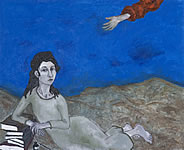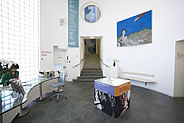 |
|||||||||
|
Partou Zia
1958 – 2008
 Partou Zia was born in Tehran, Persia in 1958 and emigrated to England in 1970. She studied Art History at the University of Warwick (1977-80) and Fine Art at the Slade (1986-91) then in 2001 completed a PhD at Falmouth College of Arts and the University of Plymouth. In 1993 she moved to Cornwall where she lived and worked with her husband, the painter Richard Cook, until her death after a courageous three year battle against cancer, in March 2008. Tate St Ives honoured her parting by hanging one of her last completed canvases, Forty Nights and Forty Days as a memorial to her, for a month, at the gallery's entrance.
Partou Zia was born in Tehran, Persia in 1958 and emigrated to England in 1970. She studied Art History at the University of Warwick (1977-80) and Fine Art at the Slade (1986-91) then in 2001 completed a PhD at Falmouth College of Arts and the University of Plymouth. In 1993 she moved to Cornwall where she lived and worked with her husband, the painter Richard Cook, until her death after a courageous three year battle against cancer, in March 2008. Tate St Ives honoured her parting by hanging one of her last completed canvases, Forty Nights and Forty Days as a memorial to her, for a month, at the gallery's entrance.
Penny Florence's uplifting obituary was published in The Guardian, where it was read by many, who were deeply moved and inspired, whether or not they had known her.
> The Guardian Obituary
> Women artists in Cornwall,
Partou Zia ~ Painter of Dreams
 In 2003 Tate St Ives initiated a pioneering residency programme at the historic Porthmeor Studios in St Ives, previously occupied by Borlase Smart, Ben Nicholson and Patrick Heron. Partou Zia was the first recipient of this award and her exhibition at Tate St Ives was accompanied by a catalogue 'Entering the Visionary Zone'.
In 2003 Tate St Ives initiated a pioneering residency programme at the historic Porthmeor Studios in St Ives, previously occupied by Borlase Smart, Ben Nicholson and Patrick Heron. Partou Zia was the first recipient of this award and her exhibition at Tate St Ives was accompanied by a catalogue 'Entering the Visionary Zone'.
Partou's canvases bring a fresh note to the long established tradition of story telling. She has been inspired by the writing and illustrations of William Blake, and her work explores a personal journey of self-discovery. Through these vibrant, painterly canvases, she draws the viewer into her dream like memory. Her own language is highly original, evolving a personal mythology of motifs and symbols that include lovers, sleepers, dreamers and readers, set within evocative interiors or luminous landscapes.
Partou joined Art First in London where she exhibited from 2004 - 2008 and thereafter, posthumously. Her work is held in the collection of the British Museum, London and in the New Hall Art Collection, Murray Edwards College, University of Cambridge.
Recently, work has been acquired for the permanent collections of Arts Council England, Tate, and University of Warwick.




